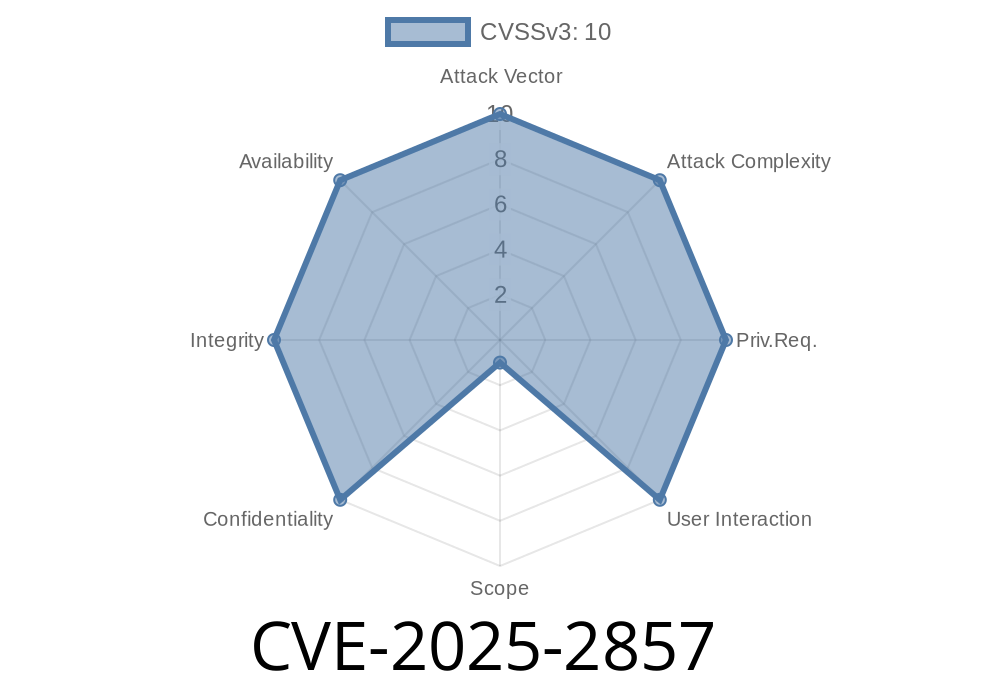Recently, the Chrome browser suffered a major security blow with CVE-2025-2783—a sandbox escape that hackers actively exploited. Hot on the heels of Chrome, researchers and developers discovered a similar vulnerability in Firefox, now tracked as CVE-2025-2857. This exclusive deep dive explains the issue, shows code snippets, explains how the exploit works, and points to the original sources for further reading.
What Is CVE-2025-2857?
CVE-2025-2857 is a sandbox escape vulnerability affecting the Windows version of Firefox prior to 136..4, as well as Firefox ESR prior to 128.8.1 and 115.21.1. This bug lets a compromised child process trick the parent browser process into returning an overly powerful handle, essentially breaking through the browser’s sandbox to run code with broader system permissions.
Vulnerability Background
After news broke about CVE-2025-2783 (the Chrome IPC sandbox escape), Mozilla’s Firefox team investigated their own browser’s IPC (Inter-Process Communication) code. They identified a nearly identical pattern:
> A malicious code running in Firefox’s sandboxed child process could make a special request that made the parent (main Firefox process), unwittingly, send back a Windows handle that grants excessive rights—enough to escape the sandbox.
Why Is This Dangerous?
Browser sandboxes are designed to isolate web code, protecting your files and OS from browser bugs. By escaping the sandbox, hackers can:
Exploit Details
The attack targets how Firefox handles requests from sandboxed processes for OS-level resources via the IPC mechanism.
Simplified Exploit Flow
1. Compromise the child: Attacker finds a bug in Firefox (say, via a buggy JavaScript JIT), gaining code execution inside the sandboxed process.
2. Forge a request: The attacker crafts a message asking the parent process for a type of handle that, due to a bug, the parent does not properly restrict.
3. Receive the handle: The child process receives a handle (such as to a privileged process or token) that should not leave the parent.
4. Use the handle: The attacker uses this handle to perform actions that were supposed to be blocked—such as reading system files, injecting code, or running unsandboxed processes.
A simplified and hypothetical example (for illustration only)
// In Firefox's IPC handler (parent process on Windows)
HANDLE answerHandle = INVALID_HANDLE_VALUE;
switch(ipcRequest.type) {
case REQUEST_OPEN_PIPE:
// Bug: Opening with too broad permissions!
answerHandle = CreateFile(ipcRequest.pipeName, GENERIC_ALL, , NULL, OPEN_EXISTING, FILE_ATTRIBUTE_NORMAL, NULL);
SendHandleToChild(answerHandle); // <-- Exploit here
break;
// ...
}
Proper code should use restricted permissions and security attributes when opening handles requested by child processes.
Original References
- Mozilla Foundation Security Advisory 2025-xx: Sandbox escape via IPC handle (CVE-2025-2857)
- Firefox Bug Tracker Entry (access may be restricted)
- Chrome’s CVE-2025-2783 Writeup
- Sandboxing in Modern Browsers (Mozilla Blog)
Restart your browser after upgrade.
3. Avoid other untrusted Windows processes—the exploit begins with a sandbox escape but still needs code execution inside the sandbox to start with.
Conclusion
CVE-2025-2857 is a high-impact vulnerability with public evidence of active exploitation. It follows a pattern already abused in Chrome and highlights how attackers are targeting mistakes in low-level IPC code to break out of browser sandboxes.
If you use Firefox on Windows, update right now and stay safe!
*For more technical deep dives, follow our updates or check the latest advisories from Mozilla Security.*
Timeline
Published on: 03/27/2025 14:15:55 UTC
Last modified on: 03/28/2025 16:15:30 UTC
